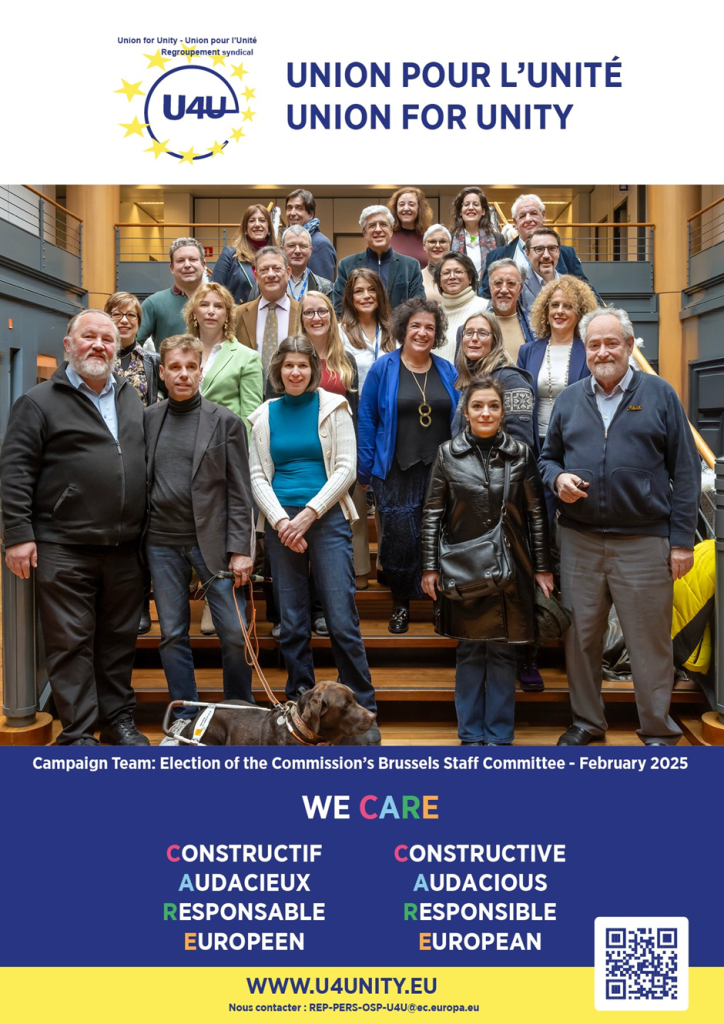Best wishes for 2025!

If Europe is to continue to move forward, our unity and our diversity are more necessary than ever. Let’s face the challenges of 2025 together. U4U stands with you and wishes you all the best.
The Union for European Unity

After a year of campaigning for the European elections on 9 June and the process of appointing and confirming the executives of the Parliament, Council and Commission, the European institutions are up and running. The Presidents of the Commission, the European Council and the European Parliament immediately held their first joint meeting and sent out a message of unity and harmony. They wrote in their communiqué: “This is the beginning of a strong partnership for Europe. The challenges ahead will not be easy, but together we can meet them (…). Europeans expect results: good jobs, a healthy climate and a stronger defence. Together we will deliver”.
This optimism of the will is opposed by the pessimism of reason. Certainly, in a spirit of unity, we must overcome the serious challenges facing the European Union (EU). Firstly, the worrying economic outlook, in particular deindustrialisation and budgetary crises, which will have a negative impact on employment, innovation and growth. Secondly, the rise of geopolitical tensions within the continent, which more than ever require a European leap of faith to finally equip ourselves with a European defence. Finally, our democracy and our values are being undermined by the rise of far-right, xenophobic and anti-European movements in most Member States. Let’s not forget Trump’s coming to power on 20 June, who could drastically reduce aid to Ukraine to defend itself against Russian aggression, impose tariffs of the order of 10-20% on European products and put pressure on the European Union to deregulate, particularly in the digital market.
It is in this hostile and uncertain environment that the European executive will have to operate during its term of office. Defining and, above all, implementing a project is fraught with difficulties. Several Member States are experiencing political crises that will not be easy to resolve. This may take several months, and the European Union will not be in a position to take important decisions easily, even if the challenges are considerable in the short term.
Poland, which takes over the rotating EU presidency on 1 January, is trying to build a “coalition of the willing” to support Ukraine and strengthen the defence of the European Union. But the country also faces an election in May 2025 to choose its new president.
In her programme, the President of the European Commission has made a number of promises for her first 100 days. Priority will be given to a “competitiveness compass” to set the course for the EU’s economic recovery, including a green industrial pact based on the recommendations of the Draghi report. A White Paper on defence will also be presented. And a “vision” on the future of European politics will be published. The Commission President has also declared that she will personally take charge of the crisis in the car industry by launching a “strategic dialogue” on the future of the sector. But social and territorial cohesion are also important to increase public support for the European ideal.
An exceptional situation calls for courage, ambition and exceptional measures. There is no doubt that the Commission will use its skills and talents to prepare documents containing ideas, guidelines and options to be explored and followed. The most important thing will be to obtain financial resources, which for the moment remain limited until the next multiannual financial framework is adopted. And human resources to match our ambitions. Will the new Commission be able to do better than in the past? More than ever, the European civil service as a whole must remain united and committed, above corporatist and personal interests. Because more than ever, the future of a strong and independent Commission at the service of the common European good is at stake.
Housing allowance in Luxembourg
Where are we?

U4U was the first trade union organisation to campaign for a housing allowance for colleagues living and working in Luxembourg.
At the end of the budgetary procedure, which has just ended with an agreement between the Parliament and the Council, we are pleased to announce that the staff concerned have achieved a first success in this matter.
We are all the more pleased that the Council initially rejected this proposal, with the exception of Parliament. It was Parliament’s sense of responsibility in refusing to allow its staff alone to benefit from this measure and in defending its colleagues in the Commission, the Court of Justice, the Court of Auditors and the other institutions and agencies present in Luxembourg (EPPO, the anti-fraud agency, etc.) that made it possible to find a compromise to the benefit of all. In concrete terms, a total of €10 million per year has been earmarked for this allowance. In principle, this allowance will be granted for a period of 4 years.
Contrary to our request, only staff on the lowest incomes will benefit from this allowance, while all staff suffer from housing costs that are much higher than in Brussels.
The amount of the allowance will be limited to a maximum of €500 per month, whereas we had asked for twice that amount, based on the average rent differential we calculated between Brussels and Luxembourg. For colleagues with incomes close to the allowance threshold, the amount of the allowance will also be reduced.
The institutions will now have to make the practical arrangements for granting the allowance. We’ll come back to this later.
A very partial victory, but also the recognition of a principle for which we will continue to fight! We believe that the purpose of the housing allowance is not only to help colleagues on the lowest salaries, but also to provide social support to all our colleagues who live in Luxembourg and who all face much higher housing costs than in Brussels.
Better prospects for contract agents
The fight goes on!

As we have already informed you, a new General Implementing Decision (GID) on the recruitment of temporary staff is currently under discussion with the administration.
With the support and at the request of the “Collectif des Contractuels”, our union organisation has seized the opportunity to use the negotiations on this decision as an opportunity to improve the career prospects of contract staff. The latest news is that there has been a shift in the positions of the various unions in favour of considering the demands of contract workers.
Of course, this is only one stage of a wider action, and the battles we are waging and will continue to wage to defend the rights of contract staff go well beyond these negotiations. In particular, we are also calling for better reclassification prospects for all (including permanent contract staff) and better mobility prospects for contract staff too (including the possibility of “round trip” mobility between agencies and institutions, as already exists, for example, between Brussels headquarters and external relations delegations).
As promised, this message provides you with an update on the ongoing negotiations.
While what we have achieved is not yet fully satisfactory, we have taken many steps in the right direction. At our meeting on 20 November, the penultimate in the current round of negotiations, we achieved a number of successes or advances.
In particular:
– The principle of more frequent internal competitions with the aim of organising internal competitions on an annual basis, taking into account the needs of the departments: this principle has been accepted by the administration;
– We continue to ask for more flexibility in the adaptation of the “anti-cumulation rule” in order to facilitate the access of contract agents to temporary posts. We will continue to fight for this, and we will also continue to call for a more thorough reform of this rule, which is unfair and creates tension and inefficiency in services. Unfortunately, some trade unions are still refusing to join us in this fight, or worse still, are fighting to keep this rule even stricter, on the pretext of reducing job insecurity and supposedly defending the European civil service, when the only effect of this rule is to maintain “turnover”, which is detrimental to the smooth running of departments and increases job insecurity;
– The principle of introducing measures to make it easier for contract agents to find out about the availability of temporary agent posts and to offer them preparatory measures for selection procedures: this principle has also been accepted by the administration;
These few advances, even if they are only the first steps in the right direction, are creating a positive momentum that will undoubtedly enable us to continue our fight against job insecurity on other fronts.
We believe that further improvements are possible and we will come back to this. We have to note that while our approach is clearly supported by half of the staff representative organisations at the moment, our progress is still being challenged by other approaches that place more emphasis, for example, on limiting the number of temporary posts.
The proponents of these approaches, who do not hesitate to describe our legitimate demands as “demagogic”, fail to see that seeking to limit the number of temporary agents, without at the same time taking clear and effective measures to facilitate access to existing posts for contract agents, actually exacerbates job insecurity.
Since the number of posts for officials is fixed in the establishment plans of the institutions (this number is set at just under 21,000 in the operating budget for 2024 and should at best remain constant over the next few years), reducing the number of temporary posts mechanically means increasing the number of contract staff, i.e. the lowest paid temporary staff. It is also a way of denying contract staff any career prospects as temporary staff.
We will therefore continue to fight for better access for contract staff to temporary posts and for temporary staff to permanent posts: this is the priority in the current and future negotiations.
We continue to support the demands of the “Collectif des contractuels” and once again invite you, if you have not already done so, to sign their petition:
https://ec.europa.eu/eusurvey/runner/Appel_des_contractuels?surveylanguage=EN
Our future is at stake now!
EEAS
To the EEAS, long live 2025?

The EEAS Staff Committee met in plenary session from 4 to 8 November – with a special additional meeting on 4 December – to take stock of the administration’s current concerns in this period of political transition and budgetary constraints.
The new High Representative/Vice-President (HRVP), Kaja Kallas, also addressed staff at the start of her term on 2 December, motivating them with her dynamic words – we need more Europe – about the challenges facing the Union. This contrasts with the words of outgoing High Representative Borrell, who in his farewell speech insisted on the need to work harder….. It emerged from these meetings that nothing has yet been decided on the new directions for the EEAS, including the reform of the delegation network, which is worrying staff in the absence of any communication from the administration – U4U/USHU has even published an open letter on the subject – apart from confirming that the closure of delegations is not on the agenda and that a large part of the changes to come will essentially depend on the Commission. Reflection on the need to adjust the size of delegations in line with a review of priorities should continue at a strategic level, and nothing will be imposed on the new HRVP, who intends to put his stamp on the service, but this will take time. Stay tuned!
So 2025 will be the year of appointments. In the meantime, local staff will begin to have their working conditions, pension fund and medical cover reviewed. Working groups will be set up for this purpose. As a result, it has been confirmed that more and more fixed-term contracts will be granted where local legislation permits, as is already the case in some countries. It should be noted that the provisions on teleworking for local staff should also be the subject of social dialogue at the beginning of 2025. The texts governing telework for headquarters and expatriates are also to be reviewed in principle, although we have no visibility on the application of the current provisions. There is also talk of reviewing the ceilings for accommodation in delegations according to the functions carried out in the delegations. The internal competitions, mainly for contract agents (but possibly also for temporary agents), should finally be published at the beginning of the year. U4U is in favour of a career in the AC category continuing in the AT category. As a result, and in the absence of further details at this stage, we will have to wait until next year…
All of this in a context in which staff motivation is declining at the same time as the feeling of being outclassed and downgraded is becoming more widespread. The results of last year’s staff satisfaction survey (one year on…), which have just been published[1] , quelle que soit la tentative de mettre en avant les aspects positifs concernant par exemple la perception d’une amélioration de la lutte contre toutes les formes de harcèlement. L’absence de perspective de carrière demeure une préoccupation majeure avec une baisse de 4% de réponses positives par rapport à la dernière enquête, se situant maintenant à seulement 33%. L’explication du « goulot d’étranglement » concernant la pyramide des âges au SEAE a fait long feu ! A l’heure actuelle, nous n’avons pas connaissance du développement d’une stratégie pour y remédier dans les années qui viennent : quel type de personnel recruter et comment, quelles filières développer ? Pas de réponse à ce stade… non plus !
, bear this out, notwithstanding the attempt to highlight the positive aspects, such as the perception of an improvement in the fight against all forms of harassment. The lack of career prospects remains a major concern, with the number of positive responses falling by 4% since the last survey to 33%. The “bottleneck” explanation for the age pyramid in the EEAS has been proven wrong! At the moment, we have no information on the development of a strategy to remedy this situation in the coming years: what kind of staff should be recruited and how, which sectors should be developed? No answer at this stage either! One positive measure, due to come into force in January and which has just been the subject of social dialogue, is the move to 90% reimbursement of public transport costs for headquarters staff who agree to limit their access to car parks. The unions have asked that consideration be given to extending the scheme, at least to delegations based in a Member State.
[1] https://intranet.eeas.europa.eu/page/administration/eeas-administration-welcomes-you/surveys
Elections of the Staff Committee at Ispra / Seville
Thanks and first lessons learned

The Staff Committee elections in Ispra / Seville have just been completed.
Many of you have placed your trust in us.
You were receptive to our approach and our proposals, and we thank you very much for that.
Our list received almost 15% of your votes and enabled us to elect two of our candidate couples. We also managed to get one pair sent to the Commission’s Central Staff Committee.
In addition to our cooperation in Ispra and Seville, ISCA and U4U, together with USHU (Unité Syndicale Hors Union), are now part of the Regroupement Syndical, an organisation present in all the workplaces of the European institutions. This makes us stronger to push forward our agenda.
The joint presentation of candidates in Ispra and Seville was an opportunity for us to promote our ideas.
For the most part:
– During the social dialogue for contract agents (CAs) in Seville (2/3 of the staff) and Ispra (almost half of the staff), we defended the concrete possibility of having more positive careers and better integration opportunities as civil servants, thanks to the transition from CAs to temporary agents (TAs) and thanks to the annual organisation of competitions for permanent posts;
– We defended the need for Seville to be considered as a seat in its own right, with the services that go with it;
– We defended the “health card” and supported its introduction for all Ispra staff who met the conditions. Unfortunately, the negotiations between the administration and the Italian authorities focused on the introduction of a limited and punitive system (“health card with an asterisk”). We are therefore continuing our fight for full health rights for the staff concerned;
– We defended greater mobility opportunities for employees;
– We defended the need for a more ambitious European budget for the next 7 years.
After the elections, the fight continues. ISCA and U4U will remain united at your side to defend a strong, independent and permanent European civil service.
For the creation of a “logistics office” at the European Parliament

Contract staff in the Parliament have either unattractive careers or insecure fixed-term contracts.
To improve the situation of this category of staff, it is possible either to convert the contracts of contract staff into AST/SC officials or to employ contract staff within an office, as is the case in the Commission.
In order to allow contract agents (CA) employed by the Parliament to benefit from a similar scheme, U4U is advocating the creation of a “Logistics Office” in the European Parliament.
Since January 2003, all the European Commission’s logistical services (management of buildings, management of supplies, management of technical and cleaning services, etc.) have been provided by two offices, one in Brussels (OIB) and the other in Luxembourg (OIL). The staff of these offices is made up of a limited number of officials and temporary staff, on the one hand, and contract staff at various levels, on the other. For the latter, working in an office has the advantage of potentially giving them access to permanent posts, whatever their function group (see Articles 3a and 85.1 of the Conditions of Employment of Other Servants).
If an office were to be set up in the Parliament, giving the staff concerned access to permanent contracts at grades other than GF1 would help to correct the relatively low pay and lack of career prospects for a large and essential part of the staff.
The office we are calling for would bring together the largest possible number of contract staff (guards, drivers, technicians, ushers) who would be eligible for permanent contracts at all grades.
This would also have the advantage of reclassifying certain functions performed by function group I CAs as GFII, which would allow them to be remunerated more in line with the service they provide to the institution. It would also open up a wider range of career prospects, thanks to the organisation of tests that would allow people to move from function group to function group IV.
Finally, the number of internal competitions would be increased and, above all, by allowing colleagues to remain in their posts for more than ten years, the right to a pension from the European Union institutions would be opened up.
These initiatives would also go a long way towards making a career in the European Parliament more attractive and retaining talent within the institution.
It should be noted that our proposal can be implemented very easily and without amending the Staff Regulations. Any change to the Staff Regulations would be a dangerous prospect, as it would open the door to reforms that would be highly unfavourable to staff of all grades.
U4U will contact the trade unions in the European Parliament to call for a joint social dialogue on this issue.
Commission car parks reserved for the disabled

Several colleagues have informed us that the OIB services are reducing the number of parking spaces reserved for people with disabilities in the Commission’s garages. We wrote to the Director of OIB, Marc Becquet, who replied very quickly and fully.
Dear Mr Becquet,
Dear Marc,
Several colleagues have informed us that the OIB services are reducing the number of parking spaces reserved for people with disabilities in the Commission’s garages.
These colleagues point out that this policy makes it more difficult for them to access the buildings and to move from one building to another.
This access is already hampered by the system of pre-booked parking in force in certain Commission buildings. This system does not allow parking spaces to be reserved in more than one building on the same day, which may be essential for colleagues with reduced mobility.
Would you be so kind as to let us know whether the OIB has a general policy of reducing the number of parking spaces reserved for people with disabilities?
If so, could you tell us what criteria are used to make these reductions?
If not, could you tell us whether certain reserved spaces have recently been used on an ad hoc basis, without being the result of an established policy? If so, could you tell us why?
Your answers will enable us to take a position on this issue and communicate with our members on a matter that directly affects them.
Could you also consider exempting disabled colleagues from the pre-booked parking system? If the number of reserved spaces is sufficient, it should be possible for them to move around and park in different buildings according to their needs without any particular problem.
We appreciate your sensitivity to this issue and thank you in advance for your response to our questions.
Yours sincerely,
Georges Vlandas Yves Caelen
Chairman Vice-Chairman
03/12/2024
**********************************************
Dear Mr Vlandas and Mr Caelen,
Dear Georges and Yves,
As you know, the OIB serves all colleagues and visitors in general and, in this context, pays particular attention to people with disabilities or reduced mobility. In this respect, access to the buildings and, consequently, ease of movement are of crucial importance. Thank you for your message, which gives me the opportunity to clarify certain points by answering your questions point by point.
Firstly, it is important to note that the current parking policy does NOT involve any reduction (across the board or otherwise) in the number of spaces reserved for people with disabilities in the Commission’s car parks.
It should also be recalled that the Where2Park car park management application was set up following the introduction by the Brussels-Capital Region of the Brussels Code on Air, Climate and Energy Management (COBRACÉ), one of the consequences of which is a reduction in the total number of parking spaces available, without affecting the number of spaces reserved for people with reduced mobility.
It’s also worth mentioning – although you probably already know this – that COBRACÉ is the result of the implementation of a European directive aimed at reducing the environmental impact of our activities and promoting sustainable mobility.
In this context, the Where2Park application helps to optimise the use of parking spaces while ensuring that they are made available to colleagues in a fair and equitable manner.
Thanks to this application, colleagues with reduced mobility are given the highest priority for parking. This priority extends to senior management. We ensure that colleagues with specific mobility needs are not disadvantaged. If all the spaces reserved for people with reduced mobility are taken, our application will automatically allocate a space in a standard car park.
In addition, the application allows you to reserve parking spaces in more than one building at different times (e.g. morning and afternoon or even ‘custom’) for colleagues who need to travel between buildings. If the journey is not planned, simply cancel the current reservation and create a new one in real time in the selected building.
In this way, Where2Park ensures that the needs of our colleagues with reduced mobility are always prioritised, even more so than without the system.
For the sake of completeness, the OIB teams are looking closely at ways to improve the solutions offered to colleagues who need to move more frequently between buildings in the same day.
Thank you again for your understanding and cooperation and for the opportunity to clarify the above points. I hope that I have convinced you of the usefulness of the Where2Park application and of the attention that OIB pays to people with reduced mobility.
Please do not hesitate to contact me if you have any further questions or would like to provide me with any other relevant information.
Kind regards,
Marc Becquet.
04/12/2024
Our holidays: defending our rights
Postponement days

U4U is committed to protecting the interests and welfare of all staff. We are calling for greater flexibility in the carry-over of overtime days into the new year, including overtime pay.
Commission Decision C(2013) 9051 of 2013 states that a maximum of 12 days can be automatically carried over and added to an official’s entitlement in January of the following calendar year. However, the decision also states that more than 12 days may be carried over only if it is proved that the official was unable to take all his annual leave during the current year because of the requirements of the service or for strictly limited reasons. The reasons mentioned in the Commission’s decision are, by way of example, health (illness, accident, recovery of annual leave following an accident or illness during annual leave), maternity leave, adoption leave, parental leave, family leave, leave on personal grounds, unpaid leave, leave for military service.
Another key document is Commission Decision C(2022) 1788 on working time and hybrid work. Most colleagues now have flexible working hours that allow overtime to be worked. The key principles are as follows: the daily working time must not exceed 10 hours; overtime must be the exception and employees may not accumulate overtime in order to take additional leave; up to 2 days of rest per month are allowed in full or half days, depending on the grade.
Colleagues work tirelessly under increasingly demanding conditions. Teleworking contributes to the intensification of the workload. With an increasing workload, a high turnover rate due to precarious working conditions and reduced recruitment in a context of budgetary constraints, we are all being asked to work longer hours.
At present, the administration is encouraging staff to limit their carry-over to the prescribed 12 days, with the implicit message that it will be difficult, if not impossible, to carry over more than the authorised number, except in exceptional cases. Data provided by Human Resources show that over the last two years more than 7,500 days of leave have been lost within the Commission. This is equivalent to about 35 full-time posts.
U4U has asked the Staff Council to prioritise this issue and bring it to the attention of Human Resources. Monitoring this process and providing all staff with information on the total number of hours lost, including the reasons, would improve the efficiency and effectiveness of our work.
In our increasingly complex daily reality, staff motivation is crucial if the Commission is to make full use of the potential and professionalism of its staff. Days off may seem trivial, but they are an essential element of recognition and motivation.
Don’t forget that deferrals of more than twelve days must be registered in Sysper using the special “deferral request” button, which will only be available from 1 to 31 January next year.
Let’s keep our rights, especially as our additional participation will make Europe stronger.
Make your voice heard and take part in the survey, your opinion counts!
| Below are the questions suggested for the survey: -Do you have more than 12 days of postponement? -Do you risk losing days? -Have you been forced to take time off to reach 12 days? -Have you lost any overtime during the year? -If so, would you like to quantify the number of hours? -Were you refused overtime? -If so, why? -Do you have anything to add? |
Please send your answers to: rep-pers-osp-U4U@ec.europa.eu
Changes in the workplace in the 21st century

Article published in GRASPE no. 49
Grasp no. 49 has just been published, following on from no. 48. Both issues deal with “Work in the light of technological and organisational change in the 21st century”. Issue 49 focuses on teleworking. It includes a report on a conference on “Health at work and psychosocial risks”, in which Loïc Lerouge took part. Teleworking implies a digital approach to work, but in our case it also involves carrying out tasks at home.
2025: Election of the Brussels Staff Committee
Elections will be held next February to elect our next representatives to the Brussels Staff Committee. The main role of the Staff Committee is to represent the interests of the staff towards the institution and to contribute to the smooth running of the services. The U4U Campaign Team is ready to take on this role and protect your interests. We have also received the necessary number of nominations to propose a full list. You will be informed in January 2025.

U4U, serving you better!

| U4U’s main resolution is to serve you even better. To achieve this, we have created direct links between you and the team that can best help you. So : – If you require personal support, please email to HR-REP-PERS-U4U-ASSISTANCE-INDIVIDUELLE@ec.europa.eu – If you would like information about training or coaching, please email to training.u4u@gmail.com – If you would like to contact colleagues in Luxembourg, please email to rep-pers-osp-u4u-lu@ec.europa.eu – If you would like to contact colleagues in the European Parliament, please email to u4u@europarl.europa.eu – If you wish to contact colleagues in the External Service, please email to u4unity@eeas.europa.eu – If you have any other questions, please send an email to our general mailbox: rep-pers-osp-u4u@ec.europa.eu We invite you to visit our website frequently and to join our Facebook page so that you have easier access to the latest news from the union about the training/coaching/workshops on offer, the conferences/cultural walks in Brussels and the events we organise throughout the year, as well as more general information about our statutes and our articles and reflections on the issues that concern us all. |